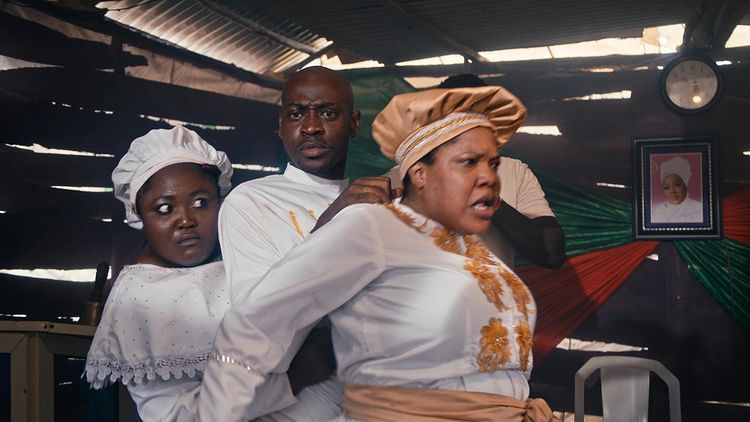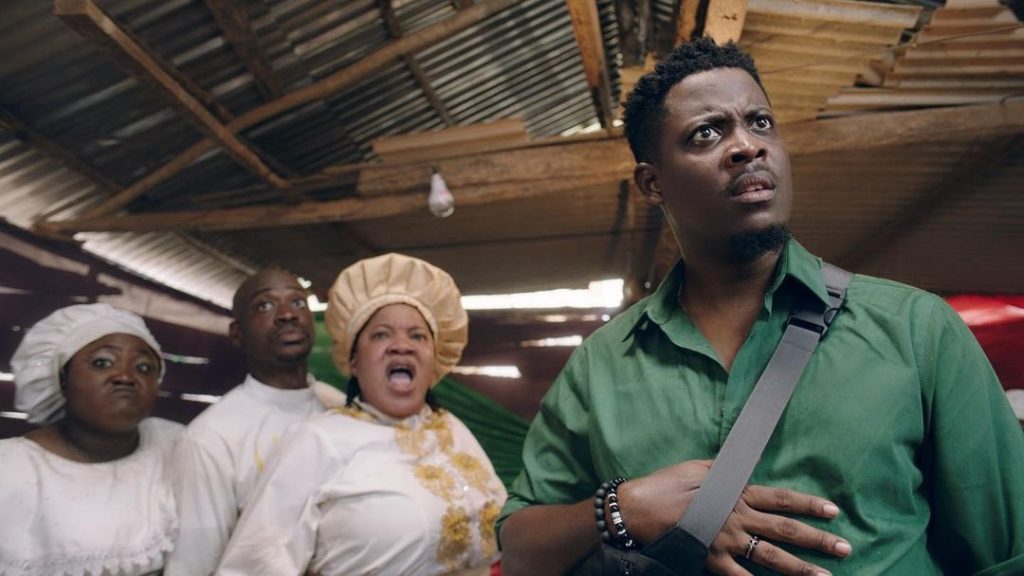The movie further exposes the relationship between the gambler and the betting company, as well as the religious gullibility of the public and their desperate need for a messiah…
By Blessing Chinwendu Nwankwo
Who doesn’t like the concept of quick wealth? Or is it the ideology that you can break the generational curse of poverty on your family with just one bet? Definitely not Nigerians.
In a country where people justify problems and quantify their sufferings to avoid giving financial aid, where Ponzi schemes like MMM have ruined lives, as it did in 2017, many Nigerians continue to fall victim to the same scheme as it resurfaced in 2019. The key, we believe, is to invest when it is new, and to exit before it sinks.
Many churches today make more money than industries, betting companies are richer than many politicians, and social media is the new oil and gas.
Niyi Akinmolayan, the award-winning Nigerian filmmaker, takes the risk of combining several of these stories which most Nigerians can relate with in this movie. He connects these themes to a backstory that justifies the rift between Labake and her sister, Ajoke. In this show-stopping release, Akinmolayan emphasises religion, gambling, and social media toxicity.
The movie, which was first released to cinemas in 2021, just made an appearance on Netflix and currently holds the number one place in movies from Nigeria. A collaboration between Anthill Production and FilmOne, Prophetess is yet another fan-pleaser, with viewers astonished by the storyline as well as the unbroken and consistent string of relatable display. The film is similar to Akinmolayan’s previous works: The Man for the Job, Elevator Baby, and the 2017 romantic comedy Wedding Party 2. Prophetess presents relatable scenarios to the audience, this time in a comedic manner.
The movie, set in Layole village in Oyo State, doesn’t waste time in introducing viewers to its protagonist, Ajoke (played by Toyin Abraham), with a very engaging start that will keep you anxious for more. From the first scene, the viewer is sure to expect a good laugh from the movie as it features some of Nollywood’s best comic actors. The movie stars Lateef Adedimeji, Uzor Arukwe, Kehinde Bankole, Deyemi Okanlawon, Stan Nze, Kunle Remi, and others.
The score and soundtrack deserve a rating of their own. They flowed with the utmost authenticity, especially at the part where Bombastic makes an entrance through the fog. For a second, it takes the mind back to the good days of Isakaba and the even happier days of Igodo.
Prophetess centres on Ajoke, a prophetess whose antics are caught on a social media live feed setup by Dipo, (Kunle Remi) who is brought in by his aunties, Shalewa (Tina Mba), and Iya Ibeji (Ronke Oshodi-Oke) for cleansing. Dipo, a Lagos-based OAP, has a large fan base. As Dipo asks the prophetess some questions, she makes some remarks that are easily misinterpreted by the public. Seeing as two of her predictions come to pass, people all over Oyo State place a huge, unlikely bet on a local football match. As a team in relegation, WonderBoys had the odds against them, and it proves to be an unlikely win.

Following the news that spread like wildfire, Ajoke wakes up to a crowd of new parishioners, and Dipo, on his end, gets an additional 100,000 followers on Instagram. The fame does not last long, as political candidate, Amani Olofaina (Seyi Awolowo), a victim of Ajoke’s deception, soon disrupts the church’s peace. Not long after, Labake (played by Kehinde Bankole) comes in and indulges Ajoke in a fight, having discovered where Ajoke was after seeing her on TV earlier that day. The backstory has it that Ajoke and Labake are sisters, and Ajoke ran away with Labake’s money seven years before. Labake had plans to invest in her future with the money, and it became the cause of the hatred between the sisters. However, the fight between them was because, still harbouring the pain from the past, Labake couldn’t bear losing another money to Ajoke as Hakeem—whose relationship with the family isn’t mentioned—places a bet with the three hundred thousand naira sent to him for their mother’s medical bills.
In the same wave, with the spread of the news that the first predictions were pure coincidence, and with an angry mob, Akinmolayan showcases an entitled set ready to blame everyone but themselves. Ajoke and Dipo soon set out to resolve this issue as it began to involve some very dangerous people, notably Fogo Bombastic, a popular street mafia boss who threatens to kill Ajoke and her nephew if her prophecy fails.
The Prophetess is set on a good track based on content delivery; however, similar to other neo-Nollywood works eager to create drama, it goes from an engaging intro, to a decent second act, and finally ruins the third act with the addition of an unnecessary plot twist that derails the movie and makes it ambiguous and exhausting. The movie further exposes the relationship between the gambler and the betting company, as well as the religious gullibility of the public and their desperate need for a messiah.

Cinematography has always been one of Akinmolayan’s high points, and in Prophetess, he measures up to the expectation. However, the movie lacks proper direction, as seen in the scenes with the angry mob, and the fracas which quickly blows out of proportion with no clear cause.
The inclusive use of the Liberty Stadium, the first stadium in Nigeria, was a smart move as it built a strong connection between the story and the audience. It was a necessary instrument to relate the story. Most Nigerian professional athletes from 1963 to the late 90s trained in the Liberty Stadium. That alone makes it an iconic feature in this movie. Also, the Layole village where the prophetess performed her craft is a small village in Oyo State, approximately four hours, 27 minutes from Lagos.
The movie unavoidably typecasts some of its characters in order to pass its message clearly, especially Okanlawon, whose entrance was fun to watch, and made me rewind a couple of times. After his stellar performance in Funke Akindele’s Omo Ghetto, the actor would surely have seen this typecast coming.
The movie is likely to face a number of positive and negative criticisms. Also, the movie deserves all the credit it gets for pulling off such a realistic football match, from the crowd, the players, and the commentary done by Nkem (Real Warri Pikin).
Hopefully, the viewers are non-sports fans, who know nothing to little about football, besides when a goal is scored. That way, Akinmolayan won’t need to explain how WonderBoy’s starplayer, Osaze, could outrun the 90 minutes football time to save the match, or even more, how a player taken out on a stretcher due to a leg injury immediately returns to play the winning penalty shot.

The movie, quite likable to be frank and hysterical as well, excellently delivers its final act and would get an audience clapping in a theatrical setting. The Prophetess was worth a trip to the cinema and yet another streaming trial on Netflix. Compared to his previous works, especially his first attempt at social media infusion in Elevator Baby, Akinmolayan has come a long way and has made recognisable growth. With his 2022 release The Man for the Job, there’s no doubt Akinmolayan is a skillful director, especially with his usage of criticisms on his previous works to make better his next. I believe it will get better from here, as neo-Nollywood is evolving.
Rating: 3.5/5
Blessing Chinwendu Nwankwo, a film critic, beautician, and accountant, currently writes from Uyo, Akwa Ibom State. Connect with her on Instagram at @bee_patrick_.




